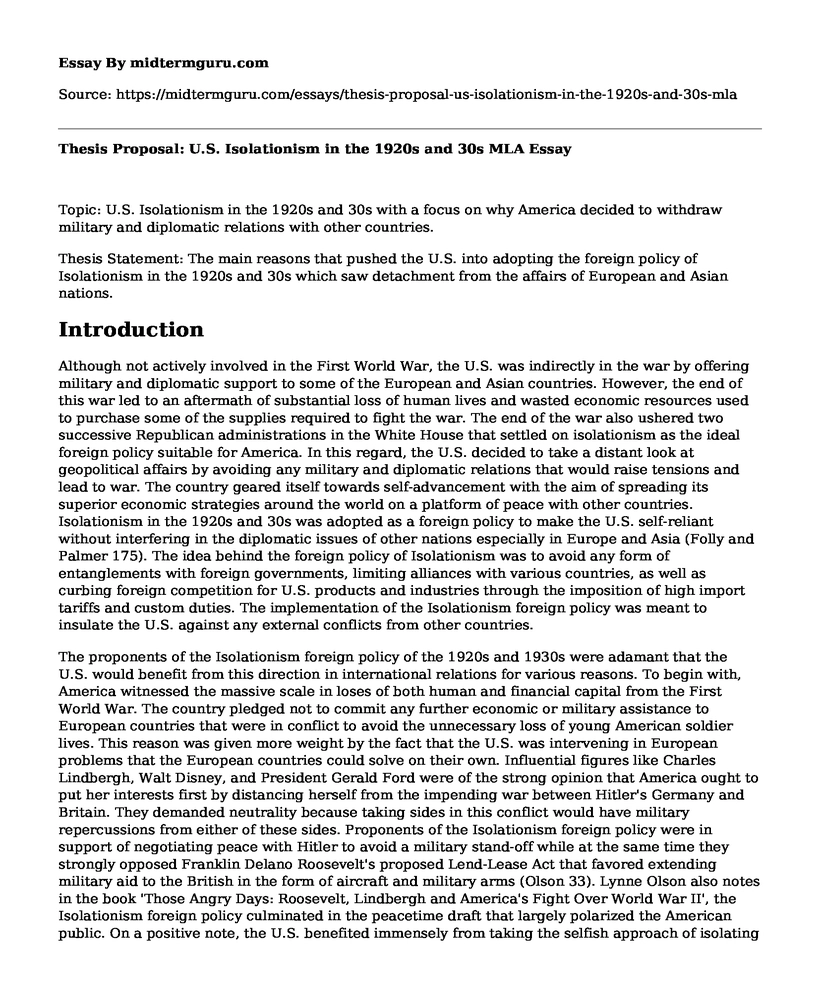Topic: U.S. Isolationism in the 1920s and 30s with a focus on why America decided to withdraw military and diplomatic relations with other countries.
Thesis Statement: The main reasons that pushed the U.S. into adopting the foreign policy of Isolationism in the 1920s and 30s which saw detachment from the affairs of European and Asian nations.
Introduction
Although not actively involved in the First World War, the U.S. was indirectly in the war by offering military and diplomatic support to some of the European and Asian countries. However, the end of this war led to an aftermath of substantial loss of human lives and wasted economic resources used to purchase some of the supplies required to fight the war. The end of the war also ushered two successive Republican administrations in the White House that settled on isolationism as the ideal foreign policy suitable for America. In this regard, the U.S. decided to take a distant look at geopolitical affairs by avoiding any military and diplomatic relations that would raise tensions and lead to war. The country geared itself towards self-advancement with the aim of spreading its superior economic strategies around the world on a platform of peace with other countries. Isolationism in the 1920s and 30s was adopted as a foreign policy to make the U.S. self-reliant without interfering in the diplomatic issues of other nations especially in Europe and Asia (Folly and Palmer 175). The idea behind the foreign policy of Isolationism was to avoid any form of entanglements with foreign governments, limiting alliances with various countries, as well as curbing foreign competition for U.S. products and industries through the imposition of high import tariffs and custom duties. The implementation of the Isolationism foreign policy was meant to insulate the U.S. against any external conflicts from other countries.
The proponents of the Isolationism foreign policy of the 1920s and 1930s were adamant that the U.S. would benefit from this direction in international relations for various reasons. To begin with, America witnessed the massive scale in loses of both human and financial capital from the First World War. The country pledged not to commit any further economic or military assistance to European countries that were in conflict to avoid the unnecessary loss of young American soldier lives. This reason was given more weight by the fact that the U.S. was intervening in European problems that the European countries could solve on their own. Influential figures like Charles Lindbergh, Walt Disney, and President Gerald Ford were of the strong opinion that America ought to put her interests first by distancing herself from the impending war between Hitler's Germany and Britain. They demanded neutrality because taking sides in this conflict would have military repercussions from either of these sides. Proponents of the Isolationism foreign policy were in support of negotiating peace with Hitler to avoid a military stand-off while at the same time they strongly opposed Franklin Delano Roosevelt's proposed Lend-Lease Act that favored extending military aid to the British in the form of aircraft and military arms (Olson 33). Lynne Olson also notes in the book 'Those Angry Days: Roosevelt, Lindbergh and America's Fight Over World War II', the Isolationism foreign policy culminated in the peacetime draft that largely polarized the American public. On a positive note, the U.S. benefited immensely from taking the selfish approach of isolating herself when the rest of the world, especially Europe, was in turmoil. The country safeguarded the lives of soldiers who could have gotten decimated in the battlefields wile it also succeeded in protecting American jobs from the influx of immigrants from other troubled countries. This further protected the U.S. manufacturing industries from the influx of cheap goods from foreign countries.
Works Cited
Folly, Martin H, and Niall A. Palmer. The A to Z of U.S. Diplomacy from World War I through World War II. Lanham, MD: Scarecrow Press, 2010.
Olson, L. (2013). Those angry days: Roosevelt, Lindbergh, and America's fight over World War II, 1939-1941. New York, Random House.
Cite this page
Thesis Proposal: U.S. Isolationism in the 1920s and 30s MLA. (2022, Aug 18). Retrieved from https://midtermguru.com/essays/thesis-proposal-us-isolationism-in-the-1920s-and-30s-mla
If you are the original author of this essay and no longer wish to have it published on the midtermguru.com website, please click below to request its removal:
- Essay on How and Why the Romans Became Involved in Greek Affairs
- Arrest Reports of Rosa Parks
- Essay Example: The Fourteenth Amendment
- Critical Response on the Epic of Gilgamesh - Literature Essay Example
- How America Mismanaged World War 1 and The Peace Process? - Paper Example
- Literary Analysis Essay on Battle Cry of Freedom
- Article Analysis Essay on "Jefferson and Slavery" and "Jefferson and the Character Issue"







